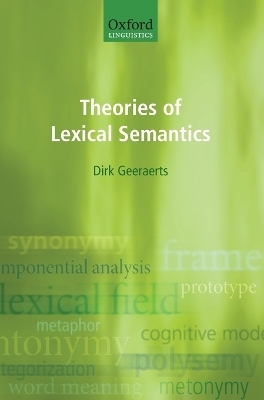
Theories of Lexical Semantics
Seiten
2009
Oxford University Press (Verlag)
978-0-19-870030-2 (ISBN)
Oxford University Press (Verlag)
978-0-19-870030-2 (ISBN)
This book offers a comprehensive overview of the major traditions of word meaning research in linguistics. It charts the evolution of lexical semantics from the mid nineteenth century to the present day, presenting the main ideas, landmark publications, and the dominant figures ofthe the five semantic traditions.
Theories of Lexical Semantics offers a comprehensive overview of the major traditions of word meaning research in linguistics. In spite of the growing importance of the lexicon in linguistic theory, no overview of the main theoretical trends in lexical semantics is currently available. This book fills that gap by charting the evolution of the discipline from the mid nineteenth century to the present day. It presents the main ideas, the landmark publications, and the dominant figures of five traditions: historical-philological semantics, structuralist semantics, generativist semantics, neostructuralist semantics, and cognitive semantics. The theoretical and methodological relationship between the approaches is a major point of attention throughout the text: going well beyond a mere chronological enumeration, the book does not only describe the theoretical currents of lexical semantics, but also the undercurrents that have shaped its evolution.
Theories of Lexical Semantics offers a comprehensive overview of the major traditions of word meaning research in linguistics. In spite of the growing importance of the lexicon in linguistic theory, no overview of the main theoretical trends in lexical semantics is currently available. This book fills that gap by charting the evolution of the discipline from the mid nineteenth century to the present day. It presents the main ideas, the landmark publications, and the dominant figures of five traditions: historical-philological semantics, structuralist semantics, generativist semantics, neostructuralist semantics, and cognitive semantics. The theoretical and methodological relationship between the approaches is a major point of attention throughout the text: going well beyond a mere chronological enumeration, the book does not only describe the theoretical currents of lexical semantics, but also the undercurrents that have shaped its evolution.
Dirk Geeraerts is Professor of Theoretical Linguistics at the University of Leuven and head of the research group Quantitative Lexicology and Variational Linguistics. He is the author of The Structure of Lexical Variation (1994), Diachronic Prototype Semantics (1997), and Words and Other Wonders (2006) and the editor, along with Hubert Cuyckens, of The Oxford Handbook of Cognitive Linguistics (2007).
Introduction ; 1. Historical-Philological Semantics ; 2. Structuralist Semantics ; 3. Generativist Semantics ; 4. Neostructuralist Semantics ; 5. Cognitive Semantics ; Conclusion ; References
| Erscheint lt. Verlag | 12.11.2009 |
|---|---|
| Zusatzinfo | small amount of figures |
| Verlagsort | Oxford |
| Sprache | englisch |
| Maße | 178 x 255 mm |
| Gewicht | 807 g |
| Themenwelt | Geisteswissenschaften ► Philosophie ► Sprachphilosophie |
| Geisteswissenschaften ► Sprach- / Literaturwissenschaft ► Sprachwissenschaft | |
| ISBN-10 | 0-19-870030-X / 019870030X |
| ISBN-13 | 978-0-19-870030-2 / 9780198700302 |
| Zustand | Neuware |
| Haben Sie eine Frage zum Produkt? |
Mehr entdecken
aus dem Bereich
aus dem Bereich
Aspekte einer Ontologie des Logos
Buch | Hardcover (2024)
Springer Fachmedien (Verlag)
119,99 €
Wie die Menschheit zu ihrer größten Erfindung kam
Buch | Softcover (2022)
C.H.Beck (Verlag)
18,00 €
Macht und Legitimität politischer Sprache im Prozess der europäischen …
Buch | Softcover (2023)
Nomos (Verlag)
74,00 €


